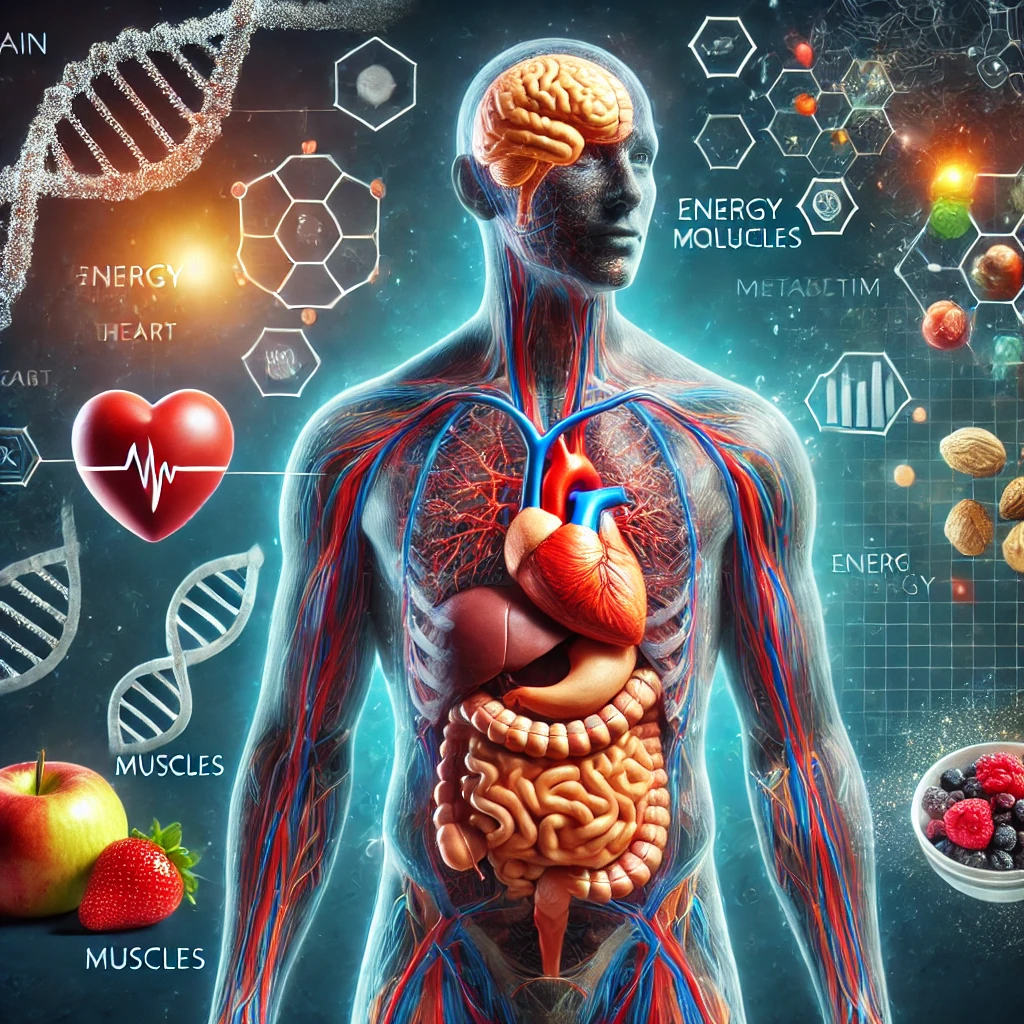Table of Contents

Introduction to Metabolism
Metabolism is a crucial biological process that encompasses all the chemical reactions occurring within an organism to maintain life. Essentially, metabolism converts the food and drink we consume into energy required for various bodily functions. This process is vital for sustaining life as it supports an array of essential activities, including breathing, circulation, and cellular repair.
At the most basic level, metabolism can be divided into two categories: catabolism and anabolism. Catabolism involves the breakdown of molecules to obtain energy, while anabolism uses this energy to synthesize all compounds required by the cells. Together, these processes enable the body to grow, heal, and respond to environmental changes effectively.
Metabolic pathways are the series of chemical reactions that occur within a cell, orchestrated by a multitude of enzymes and cofactors. These pathways are finely tuned and highly regulated, ensuring that the body’s energy needs are met without excessive waste. The ability of metabolism to transform the caloric content of food into usable energy is fundamental to the survival and functionality of all living organisms.
Furthermore, the rate at which metabolism occurs—often referred to as metabolic rate—varies from person to person. Several factors influence metabolic rate, including age, sex, genetic predisposition, hormonal balances, and even the level of physical activity. This rate determines how quickly or slowly the body’s chemical reactions take place, directly affecting energy consumption and overall health.
Understanding these basic aspects of metabolism is pivotal to comprehending how the body works on a biochemical level. As we delve deeper into the intricate systems that contribute to metabolic processes, it becomes apparent how pivotal metabolism is not only to energy production but also to thriving bodily functions that sustain an organism’s life.
Understanding Basal Metabolic Rate (BMR)
Basal Metabolic Rate (BMR) is a critical component of metabolic science, representing the number of calories your body requires to perform essential life-sustaining functions while at rest. These functions include breathing, circulation, cell production, and maintaining body temperature. Essentially, BMR constitutes the energy expended by the body to maintain vital health processes without any physical activity.
Several factors influence an individual’s BMR. Firstly, age plays a significant role. As individuals age, their BMR typically declines, primarily due to a decrease in muscle mass and an increase in fat deposits. Secondly, sex is another determinant. Generally, males tend to have a higher BMR compared to females, owing to a greater proportion of muscle mass which consumes more energy than fat tissue.
Genetics also substantially affect BMR. Each person inherits a unique metabolic rate from their parents, which can predispose them to have either a faster or slower metabolism. While this genetic predisposition can be influential, it is not the sole determinant of an individual’s BMR.
Additionally, body composition is a pivotal factor. Muscle tissue is metabolically more active than fat tissue, meaning individuals with higher muscle mass will generally have a higher BMR. Body composition can be influenced by lifestyle choices such as diet and exercise, allowing some degree of control over one’s BMR.
Understanding these factors is crucial for comprehending how your metabolism operates and what might be influencing its efficiency. By acknowledging the interplay between age, sex, genetics, and body composition, individuals can better grasp what drives their metabolic rate and how to potentially enhance it to meet their health and fitness goals.
The Role of Hormones in Metabolism
Understanding the intricate role hormones play in metabolism is crucial for grasping the full scope of how our bodies convert food into energy. Hormones act as messengers in the body, orchestrating numerous physiological processes, including those involved in metabolism. Several key hormones such as thyroid hormones, insulin, and cortisol, significantly influence metabolic rate and energy balance.
Thyroid hormones, primarily thyroxine (T4) and triiodothyronine (T3), are produced by the thyroid gland and are central to regulating metabolic processes. These hormones increase the basal metabolic rate by promoting oxygen consumption and heat production in cells. An imbalance in thyroid hormones can lead to disorders such as hypothyroidism or hyperthyroidism, which respectively slow down or accelerate metabolic functions, impacting weight and energy levels.
Insulin, secreted by the pancreas, is another critical hormone in metabolism. It facilitates glucose uptake from the bloodstream into cells, making glucose available for energy production or storage. Proper insulin function helps maintain stable blood sugar levels. However, insulin resistance, a condition where cells fail to respond effectively to insulin, can lead to metabolic disorders such as type 2 diabetes and metabolic syndrome.
Cortisol, commonly known as the stress hormone, is produced by the adrenal glands and plays a key role in managing the body’s response to stress. It influences metabolism by regulating glucose production, fat storage, and protein metabolism. Chronic stress can lead to elevated cortisol levels, which may disrupt normal metabolic functions, contributing to weight gain and other metabolic issues.
An imbalance in any of these hormones can significantly impact overall metabolic health. For example, people with hypothyroidism often experience weight gain and fatigue due to slowed metabolism, while those with hyperthyroidism may face weight loss and increased metabolism. Similarly, insulin resistance can cause chronic high blood sugar, leading to an increased risk of diabetes and cardiovascular conditions. Understanding these hormonal influences is vital for managing and optimizing metabolic health.
Factors That Affect Your Metabolic Rate
Numerous factors influence an individual’s metabolic rate, significantly impacting how effectively the body converts food into energy. One of the primary factors is muscle mass. Muscle tissue is metabolically active, meaning it requires more calories for maintenance than fat tissue. Therefore, individuals with higher muscle mass tend to have a faster metabolism, as their bodies burn more calories at rest.
Physical activity is another crucial determinant of metabolic rate. Engaging in regular exercise not only boosts the number of calories burned during the session but also elevates the resting metabolic rate post-exercise. The energy expenditure involved in both aerobic and anaerobic activities enhances the body’s metabolic efficiency over time.
Dietary choices play a pivotal role as well. Consuming a diet rich in protein can increase thermogenesis—the process by which the body generates heat from digesting food—thereby temporarily boosting the metabolic rate. On the other hand, diets high in sugars and refined carbs can lead to metabolic dysregulation and decreased efficiency in energy conversion. Furthermore, frequent small meals can maintain a steady metabolic rate compared to infrequent, larger meals.
Environmental temperature affects metabolism through thermoregulatory processes. Exposure to cold can elevate metabolic rate as the body works harder to generate heat and maintain core temperature. Conversely, extremely hot environments can slightly increase metabolic demands due to heat dissipation efforts.
Lifestyle choices, such as smoking and alcohol consumption, also have profound impacts. Nicotine stimulates the release of adrenaline, momentarily increasing metabolic rate, but the overall health detriments render this inefficacious for safe metabolic enhancement. Alcohol, while being calorie-dense, can slow down metabolic processes by prioritizing its metabolism over that of other nutrients, leading to potential metabolic inefficiency.
Understanding these factors and their underlying mechanisms provides valuable insight into optimizing metabolic health. By fostering beneficial habits like maintaining muscle mass, engaging in regular activity, and making conscious dietary and lifestyle choices, individuals can positively influence their metabolic rates.
Diet and Metabolism

Understanding the intricate relationship between diet and metabolism is vital for optimizing one’s metabolic rate. Metabolism, the process by which the body converts food into energy, is significantly influenced by the nutrients we consume. Macronutrients, such as proteins, fats, and carbohydrates, play distinct and essential roles in this process. Protein, for example, not only supports muscle growth and repair but also has a high thermogenic effect, meaning that the body uses more energy to digest protein compared to fats or carbohydrates. Thus, a protein-rich diet can contribute to a higher metabolic rate.
Fats, while often misunderstood, are indispensable for various metabolic functions. They are crucial for hormone production, including those that regulate metabolism. Healthy fats found in avocados, nuts, and olive oil can support metabolic health. Conversely, trans fats and excessive saturated fats may slow down metabolism due to their negative impact on insulin sensitivity and inflammation levels. Carbohydrates are the body’s primary energy source. Consuming complex carbohydrates, such as whole grains, fruits, and vegetables, ensures a steady release of energy, preventing spikes and crashes in blood sugar levels which can impede metabolic efficiency.
Micronutrients, though required in smaller quantities, are no less important. Vitamins and minerals such as Vitamin B, Vitamin D, iron, and magnesium are critical for metabolic pathways, including those involved in energy production and DNA synthesis. For instance, B vitamins are involved in converting carbohydrates into energy. A deficiency in these essential nutrients can lead to metabolic sluggishness.
Certain foods are known to boost metabolism. Green tea, rich in catechins, has been shown to enhance fat oxidation. Spices like chili peppers contain capsaicin, which can temporarily increase metabolic rate. Moreover, eating patterns like intermittent fasting have gained popularity for their potential metabolic benefits. This eating approach can improve insulin sensitivity and increase cellular repair processes, collectively enhancing metabolic health. Adopting such dietary strategies can be a powerful tool in managing and boosting one’s metabolism effectively.
Exercise and Its Impact on Metabolism

The relationship between physical activity and metabolism is fundamental to understanding how to effectively enhance one’s metabolic rate. Physical exercise plays a crucial role in determining both short-term and long-term metabolic health. Engaging in various forms of exercise significantly influences metabolic processes, contributing to an improved basal metabolic rate (BMR) and overall energy expenditure.
Cardiovascular exercises, such as running, swimming, and cycling, lead to immediate increases in metabolic rate. This occurs as the body demands more energy to fuel prolonged activity, thereby burning more calories. Cardio exercises also promote cardiovascular health, contributing to improved efficiency in oxygen and nutrient delivery to tissues, which can have a lasting effect on one’s metabolic rate. Furthermore, consistent cardio workouts can enhance the body’s ability to oxidize fats and carbohydrates, improving metabolic flexibility.
Strength training, or resistance training, offers another avenue to improve metabolic health. Activities such as weightlifting, push-ups, and resistance band workouts stimulate muscle growth, increasing lean muscle mass. This is significant because muscle tissue is metabolically more active than fat tissue. Consequently, a higher muscle mass results in a higher basal metabolic rate, as muscles require more energy for maintenance, even at rest. Strength training ensures that the increased metabolic rate is sustained over the long term, contributing to more efficient calorie utilization and improved body composition.
High-intensity interval training (HIIT), which involves bursts of intense activity followed by short rest periods, is particularly effective for boosting metabolism. HIIT induces a phenomenon known as excess post-exercise oxygen consumption (EPOC), where the body continues to burn calories even after the workout is completed. The heightened metabolic rate post-HIIT can last for several hours, providing a significant boost to overall energy expenditure.
In essence, incorporating a variety of exercise forms – cardio, strength training, and HIIT – can optimize metabolic health. Regular, consistent physical activity leads to both immediate and sustained improvements in basal and overall metabolic rate, ultimately supporting enhanced energy management and overall well-being.
Sleep and Stress: Hidden Influencers

Understanding the impact of sleep and stress on metabolism is pivotal when considering how to enhance metabolic function. While diet and exercise are commonly acknowledged factors, the roles of sleep and stress remain equally significant but often overlooked.
Sleep deprivation has profound effects on metabolic health and weight management. Inadequate sleep disrupts the body’s natural circadian rhythm, which in turn affects hormonal balance. For instance, lack of sleep impairs the secretion of insulin, a hormone crucial for glucose regulation. Consequently, this can lead to insulin resistance, a precursor to metabolic disorders such as type 2 diabetes. Additionally, sleep deprivation has been linked to decreased levels of leptin, the hormone responsible for signaling satiety, and increased levels of ghrelin, the hunger hormone. This imbalance encourages overeating and weight gain, further complicating metabolic health.
Equally pernicious is the impact of chronic stress. Prolonged exposure to stress triggers the release of cortisol, a hormone designed for short-term crisis management. However, when stress becomes chronic, elevated cortisol levels can lead to various metabolic issues. High cortisol impairs glucose metabolism and promotes fat storage, particularly around the abdomen—an area linked to increased risk for metabolic syndrome. Moreover, chronic stress can disrupt normal eating behaviors, either through compulsive overeating or loss of appetite, both of which can unfavorably alter metabolism.
Addressing the hidden influencers of sleep and stress provides a comprehensive approach to metabolic health. Prioritizing adequate sleep and implementing stress-reduction techniques can significantly enhance metabolic efficiency. Simple steps like maintaining a regular sleep schedule, incorporating relaxation exercises such as yoga or meditation, and managing daily stressors can help mitigate the adverse effects on metabolism. By recognizing and addressing these often-overlooked factors, individuals can take proactive steps towards optimizing their metabolic health.
Practical Tips to Boost Your Metabolism
Enhancing your metabolic rate involves a combination of strategic lifestyle changes. Here are several practical tips that can help naturally boost your metabolism:
Firstly, maintaining regular meal times is crucial. Skipping meals or eating at irregular intervals can disrupt your metabolic efficiency. Consistency in meal timing helps your body regulate its energy expenditure and maintain a steady metabolic rate. It’s advisable to eat several small meals throughout the day instead of fewer large ones to keep your metabolism active.
Staying adequately hydrated is also important. Water plays a key role in the body’s thermogenic process, wherein water induces a mild increase in metabolism due to the energy used to heat it to body temperature. Drinking water regularly can help ensure your metabolic processes function optimally.
Incorporating strength training exercises into your routine is another effective way to boost metabolism. Muscle tissue burns more calories at rest compared to fat tissue. Thus, building muscle through activities such as weight lifting, resistance training, or bodyweight exercises can significantly elevate your metabolic rate. This also aids in long-term metabolic health as muscle mass typically decreases with age.
Ensuring adequate sleep is an often overlooked but critical factor. Poor sleep can disrupt metabolic functions and lead to weight gain. Getting 7-9 hours of quality sleep per night can optimize your metabolism by regulating hormones such as cortisol and insulin that are involved in metabolic processes.
Lastly, remember that sustained changes in lifestyle are more beneficial than quick fixes. Fad diets and rapid weight loss plans often result in temporary changes that don’t contribute to long-term metabolic health. Focusing on consistent, healthy habits will lead to more lasting results in enhancing your metabolism.






I was reading some of your content on this site and I believe this site is very informative! Continue putting up.